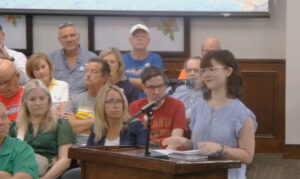Peachtree City Councilman Eric Imker last week thought he had enough votes among his fellow council members to halt an estimated $45,000 design expenditure for the widening of the cart path bridge over Lake Peachtree.
As it turned out, Imker was the only council member voting in favor of postponing the project. After Councilman Doug Sturbaum suggested the bridge widening could be eligible for federal stimulus funds if the design were completed, the rest of council voted for the project to proceed: Sturbaum, council members Kim Learnard and Vanessa Fleisch and Mayor Don Haddix.
Imker said he has no problem going along with council’s decision on the matter and no hard feelings about the vote. He said he would have preferred to put the money towards street and cart path maintenance in an effort to help balance next year’s budget.
The stimulus theory did catch Imker by surprise, as he was made aware of it minutes before the council meeting.
The current bridge is seven feet wide, just enough to fit a golf cart going in one direction. Building a wider bridge, which council has not yet voted to do, is not a necessity for the city, Imker said.
“It has not been a safety issue,” Imker said of the existing narrow bridge. “… We were told the structure was sound for 30 years to come. Let’s not go out and spend our money on something that doesn’t need to be spent on right now.”
Imker said the project could be done in future years when funding is available.
“Funding special projects out of the general fund has to be put on hold,” Imker said. “I’m sure all citizens will understand that in this current economic environment.”
The design funds are coming from the transportation Special Purpose Local Option Sales Tax revenues, and if council ultimately approves construction the SPLOST revenues will also be used.
Imker contends the city’s budget outlook this year is worsening though he is not worried about being able to cover the shortfall. City staff has whittled the 2011-2012 budget shortfall from more than $3 million to about $1 million, he noted.
Imker says thanks to citizen contributions he has enough budget-cutting ideas to cover a $2 million shortfall. Such cuts could be enacted and still balance the budget without any need for a property tax increase or use of the city’s cash reserves, he said.
Those cuts would pose at least some hardship on city employees, Imker acknowledged.
“Every business across the country is having to be a little harder on their employees,” Imker said. “Government is no exception.”
While the city needs to balance its 2011-2012 budget, it also needs to make changes to make sure the budget is sustainable for the future, Imker added.
The transportation SPLOST itself is to blame in part for the city’s financial woes, Imker said. He noted that the SPLOST allowed the city to divert funds for road and cart path improvements and maintenance that should be part of the city’s general fund budget.
The SPLOST solely should have funded special transportation projects that the city otherwise couldn’t have afforded to do, Imker said.
Imker said another contributing factor to the city’s budget woes was the previous council’s decision to use reserve funds instead of balancing the budget based on revenues.










Leave a Comment
You must be logged in to post a comment.